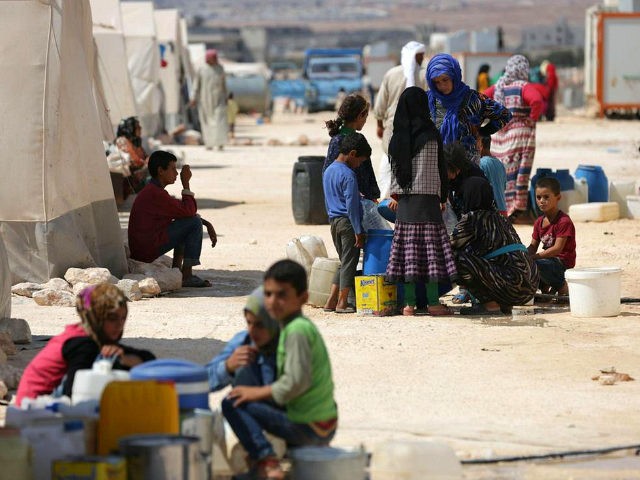The U.N. Office for the Coordination of Humanitarian Affairs (OCHA) said on Monday that over 30,000 people have already fled their homes in the Idlib province of Syria, as dictator Bashar Assad and his allies in Russia and Iran step up air and artillery strikes.
The U.N. warned that Assad’s invasion of Idlib could be the worst humanitarian catastrophe in a long and brutal civil war.
In fact, OCHA chief Mark Lowcock warned that 800,000 refugees could be driven out of Idlib, making it “the worst humanitarian catastrophe of the 21st Century.”
The Associated Press cited the London-based Syrian Observatory for Human Rights and Syria’s “White Helmet” civil defense force reporting that airstrikes on Monday inflicted civilian casualties and forced people to flee their homes. The Syrian military has been blanketing the area with leaflets warning rebel forces to surrender or face an assault of unprecedented ferocity.
A 22-year-old White Helmet volunteer named Anas al-Diab was able to keep his camera rolling after he was injured in an Idlib airstrike on Friday. The White Helmets passed the footage along to CNN, which published the video on Tuesday, warning that it contains gruesome images of Diab struggling to stand despite bloody wounds on his legs:
“Guys, guys, please come carry me,” he shouts to his fellow rescue workers, the video shows. “I can’t move.”
Several other men try to get him to safety, but without a stretcher, they are forced to drag him out, his bloody legs trailing through the dusty debris.
“I know you, I know you! My dear Anas!” one of Diab’s friends says as he rushes to help him.
Then comes the whoosh of a plane, another bomb lands and the men are pinned to the ground. One grabs his radio and calls for backup.
The White Helmets are well aware that Syria and Russia have accused them of falsifying video of civilian injuries and chemical weapons attacks.
“They are targeting innocent civilians and trying to kill as many of us as possible. As I was being rescued I told the guys to hold onto the camera because it has the material that can incriminate this criminal and send him to an international court,” Diab said from his hospital bed.
Turkey echoed the OCHA warning at a meeting of the U.N. Security Council on Tuesday. Turkish ambassador Feridun Sinirlioglu said there is “no doubt that an all-out military operation would result in a major humanitarian catastrophe,” triggering a “massive wave of refugees and tremendous security risks for Turkey, the rest of Europe, and beyond.”
U.S. Ambassador Nikki Haley said Syria, Russia, and Iran have already launched a hundred airstrikes on Idlib and are planning a “bloody military conquest.” Britain and France also backed Turkey’s call for a ceasefire.
Russia’s delegation responded by restating its commitment to fight “terrorists” in Idlib.
“We cannot allow terrorists to hold hostage and use hundreds of thousands of people of Idlib as human shields,” insisted Russian ambassador Vassily Nebenzia.
Russia’s envoy to Syria, Alexander Lavrentiev, met with U.N. special envoy Staffan de Mistura on Tuesday and said it would be preferable to resolve the Idlib situation in a “peaceful way” — a responsibility he laid at the feet of Turkey.
Lavrentiev described Idlib as “a sort of zone of responsibility for Turkey,” since it has forces in the area. He said it was Turkey’s responsibility to “separate the moderate opposition from the extremists” such as al-Qaeda’s Syrian operation, the Nusra Front.
Qatar-based Al-Jazeera reported on Tuesday afternoon that a “temporary calm” has settled over northwestern Syria, a pause in steadily-escalating airstrikes and artillery bombardments that seemed intended to allow some displaced persons to return home. Some 8,000 Idlib residents have already flooded into refugee camps — a far greater load than the camps were designed to handle, leaving food and medicine in short supply.

COMMENTS
Please let us know if you're having issues with commenting.